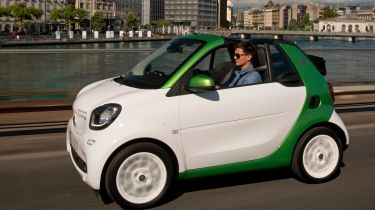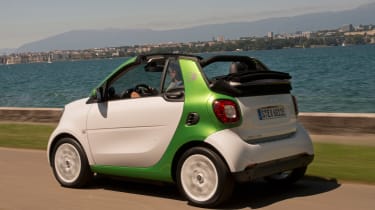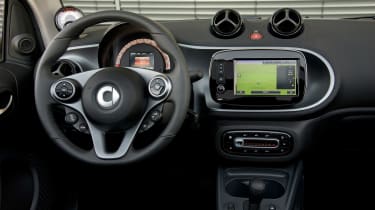New Smart ForTwo Cabrio Electric Drive review
It's the world's first mass produced electric convertible, but is the Smart ForTwo Cabrio Electric Drive worth its chunky price tag?

As a second car to use in town or on short commutes, the ForTwo Cabriolet Electric Drive is a fun and funky offering that has no direct rivals. It’s more enjoyable to thread through traffic than most convertibles, too, although its limitations are clear when you venture out of the city. It’ll be a sizeable outlay for such a small and impractical car, but at least there are no battery leasing charges to worry about.
We’ve already sampled the Smart ForTwo and ForFour Electric Drive in hardtop form, earlier this year. Now it’s time for our first go in the battery-powered version of the smallest convertible on sale. Interestingly, it’s also the world’s first mass-produced electric drop-top. Does retracting the roof enhance its appeal?
This is the second-generation of Smart’s electric convertible, and there have been a few key improvements. Firstly, it’s considerably wider – allowing for a more accommodating cabin – yet it’s still just 2.69m long, allowing savvy owners to legally stick theirs sideways into parallel parking spaces. It also retains the sub seven-metre turning circle that makes it an absolute breeze to manoeuvre in tight spots.
• Best electric cars to buy now
Smart has also thrown out the Bosch electric motor from the old car, replacing it with Daimler’s own three-phase synchronous motor producing 81bhp and a healthy 160Nm of torque. It’s mated to a lithium-ion battery pack, fitted under the seats, that has the same 17.6kWh capacity but greater energy density.
This allows for another 10 miles of range, up to 96 miles officially, although Smart also quotes a realistic use figure (with eco mode turned off and the air-con running) of about 75 miles. A full charge is achieved in 2.5hours via a wallbox, although, as with the hard-top, it’s disappointing to hear that the 22kWh fast charger still won’t be available until later this year. The range is some way off the claimed 180 miles of a 41kWh Renault Zoe, but the only way you can remove the roof of that car is with an angle grinder.
Used - available now

2022 Mercedes
EQA
21,343 milesAutomaticElectric
Cash £23,800
2022 Mercedes
CLA
88,049 milesAutomaticPetrol1.3L
Cash £19,300
2024 BMW
M135i
29,519 milesAutomaticPetrol2.0L
Cash £24,487
2022 Audi
A4
37,569 milesManualPetrol2.0L
Cash £15,887Speaking of the ForTwo’s roof, it’s a cloth affair that retracts in two stages – press the button once to bring it back to the trailing edge of the doors like a sunroof, or press it again to fold the rear window section back onto the deck (and remove any rear visibility). You can also pop out the side bars in the roof and store them in the tailgate. Although the boot is identical to the petrol ForTwo Cabrio at 260-litres, the opening is narrow so you’ll only squeeze in a couple of small cases.
On the move the roofless ForTwo ED is as entertainingly agile as its hard-top equivalent. The only real effect of the extra 230kg the batteries add is the increased stability through fast bends, but this is still a car far more at home in the city due to its limited range and top speed.
• Best convertibles on sale now
In town its instant torque delivery and rapid 0-40mph time ensure it excels at the traffic light grand prix, while the quick steering lets you dart about the place with enjoyable ease. The only blot on its copybook is how blustery it becomes above 50mph. Still, the cabin is reasonably well-made and funky to look at, and although storage isn’t great, there’s plenty of space for two large adults.
The ForTwo Cabriolet Electric Drive starts from £18,560 including the £4,500 plug-in car grant, which is £2,140 more than the hard-top. It might seem a bit rich for a two-seat city car that only just cracks 80mph, but the lack of any battery leasing charges takes the sting out of the initial outlay. However, if you’re not dead-set on an EV the small, economical, two-seat Mazda MX-5 starts from an identical price point. Even with the fuel savings, that’s a tricky car to ignore.









